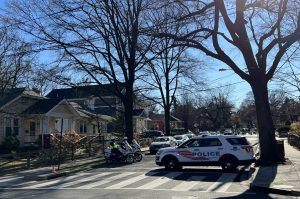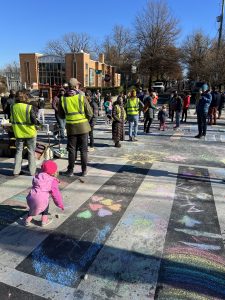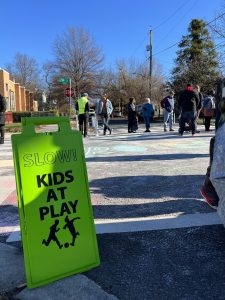“The manholes have never looked so pretty,” Rachel Maisler told a young girl using chalk to draw on the intersection of 14th and Irving Streets Northeast Sunday. Children ran across the intersection carefree, occasionally stopping to decorate the streets with chalk as their parents watched and discussed street safety.
Maisler, along with Chalk Riot, organized a shutdown of the intersection to advocate for safer streets in memory of Allie Hart, a five-year-old who lived in the neighborhood before being struck and killed on her bicycle by a driver in September.
“We were trying to think of a way to memorialize what happened here while also celebrating her life,” Maisler said in an interview. “As a 5-year-old, she loved hearts and flowers, and we’re just here drawing on the sidewalk and filling it with what Allie loved.”

Police blocked the four entrances of the intersection after hearing about the protest. Maisler said she did not acquire a permit for the event because she believed the community’s right to gather in protest is guaranteed by the First Amendment.
Maisler plans memorials for all city cyclists struck and killed by cars. Allie’s story, she said, is heartbreaking but not out of the ordinary. A car struck and injured another child, 9, last week.
According to D.C. Vision Zero data, 39 people have been killed in vehicular incidents this year. Vision Zero, which Maisler labeled as a good but severely underfunded program, is the city’s initiative to end traffic fatalities by 2024. The Wash reported on the unlikely ability to accomplish the program’s goals earlier this year.
Keeping up with all the accidents is proving to be more and more difficult, Maisler said.
“My God, I mean every time this happens, it’s a preventable crash, and the community is aching and looking for ways to call on the mayor, call on the district,” Maisler said.
City Council-at-Large member Christine Henderson attended Sunday’s event with her daughter. Henderson sits on the Committee on Transportation and the Environment and felt “pleasantly surprised” the police blocked off the intersection for community members.
Henderson said community members gathering to advocate for safety and taking up the street “didn’t hurt anybody” and were “not a huge inconvenience.” It did, however, allow them an opportunity to gather together and show support for the families impacted by traffic violence.

Henderson said she is working toward legislation specifically promoting infrastructure around schools to help keep children safe, especially as students return to in-person classes.
“For kids just coming back in person, we can’t say to families ‘yes, your kids will be safe walking in crosswalks to and from school,’ so we need to do more to get cars to slow down,” Henderson said in an interview.
Allie’s teacher, Wendy Aleman, attended the event and said Allie’s death “traumatized” her. Even when taking children to the park to play a couple of blocks from their school, Aleman said she is flooded with memories of Allie as she tries to keep the students safe.
“Now is better than before,” Aleman said. “I couldn’t stop thinking about [Allie] and crying.”
Aleman’s daughter was in Allie’s class, along with Thor and Leah Cheston’s daughter. One of the hardest parts, the parents agreed, was figuring out how to tell their children.
Leah Cheston found out about Allie’s death through a parents’ group message. She and the other mothers then called one another as they “Googled how to tell your 4-year-old that her friend died.”
“It’s really hard. It’s really hard to tell your four-year-old that her friend isn’t coming back,” Leah Cheston said.
Leah and Thor Cheston said they have considered moving out of D.C. because of the traffic violence. Drivers, Thor Cheston said, are “selfish” and do not care about pedestrians.

Thor Cheston hoped the protest would make a change because people were not safe as long as the government did nothing to help.
“Somebody needs to be pulling these people over and holding them accountable, and it’s not happening, it’s not,” Thor Cheston said.
Community members have done their part, Henderson said. Now, she believed the government had to act.
“We need our agencies to react and respond to the advocacy we have seen thus far,” Henderson said. “I don’t want to tell people ‘You have to march 10 times’ or ‘You have to do these types of events at every school in order to get someone to notice.’ It shouldn’t take this.”















Add comment